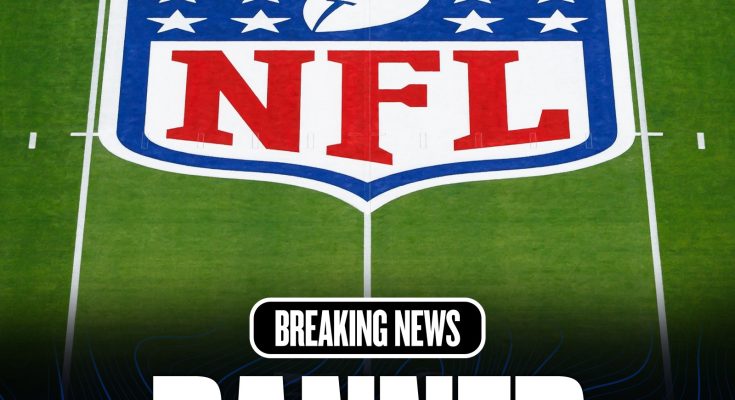The recent incident involving a fan shoving Baltimore Ravens wide receiver DeAndre Hopkins during a heated moment at the stadium has drawn significant attention across the NFL community. The fan’s actions, which escalated into a physical confrontation involving Ravens quarterback Lamar Jackson, have resulted in a decisive response from team officials. According to a source close to the Buffalo Bills organization, the fan responsible for the initial shove has been “indefinitely banned from Bills and NFL stadiums.” This disciplinary action underscores the league’s zero-tolerance policy toward fan interference with players, as well as the growing importance of maintaining a safe and respectful environment for athletes and spectators alike.
To understand the full context and implications of this event, it’s essential to explore the dynamics that led to the confrontation, the reactions from the involved parties, and the broader consequences for stadium security protocols and fan conduct policies. Football, especially at the professional level, is a high-intensity sport, where emotions run high for both players and fans. While the passion displayed by fans is part of what makes the NFL such a compelling spectacle, there are boundaries that must not be crossed to protect the integrity of the game and the safety of its participants.
The incident unfolded during a critical game, with tensions already running high. The Ravens, led by their dynamic quarterback Lamar Jackson, were battling fiercely against the Bills, with every play carrying immense weight in the outcome. As the game progressed, emotions spilled over into the stands, where the proximity between fans and players sometimes becomes dangerously thin. It was in this charged atmosphere that the fan reportedly reached over the boundary line and shoved DeAndre Hopkins, one of Baltimore’s premier offensive weapons.
Hopkins, known not just for his incredible athletic ability but also for his composure and professionalism, was caught off guard by the unexpected physical contact. The shove was a blatant act of fan interference, violating NFL rules and stadium policies designed to keep players safe from spectator intrusion. The reaction from the players was swift. Lamar Jackson, observing the assault on his teammate, did not hesitate to step in and confront the offending fan. Jackson’s shove, though reactive, was an understandable response given the circumstances—defending a teammate and sending a message that such behavior will not be tolerated.
The back-and-forth between the fan and the players quickly drew the attention of stadium security and officials, who intervened to de-escalate the situation. Both the fan and the players were separated, and the fan was promptly removed from the premises. However, the incident sparked a larger conversation about fan behavior and the responsibilities of stadiums and teams to prevent similar episodes in the future.
Following the game, a statement was released by a team official from the Buffalo Bills, confirming the indefinite ban of the fan from Bills and NFL stadiums. This ban is not merely a suspension for the remainder of the current season or a single game but a long-term prohibition designed to send a clear signal. The league and teams are committed to fostering an environment where fans can enjoy the game without crossing the line into dangerous or disruptive conduct.
The indefinite ban is also reflective of the NFL’s broader stance on security and fan interaction. Over recent years, there have been multiple incidents across various stadiums involving fans attempting to engage physically with players, sometimes with severe consequences. The league has consistently updated its policies to address these issues more robustly, including enhanced security protocols, stricter penalties for offenders, and educational campaigns aimed at promoting respectful fan behavior.
In this particular case, the shoving incident raises several important questions about the challenges faced by stadium security teams. How did the fan manage to get close enough to a player to make physical contact? Was there a lapse in security measures, or did the fan act quickly and unexpectedly? These questions highlight the delicate balance stadium officials must strike between providing fans with an intimate, thrilling experience and ensuring the safety of players and staff.
Moreover, the incident shines a light on the psychological toll such encounters can have on players. Athletes in the NFL are conditioned to face physical challenges on the field—tackles, hits, and collisions are part of the game. However, when that physicality comes from outside the field of play, especially from fans, it introduces an unpredictable element that can be both mentally and emotionally taxing. Players rely on the understanding that fans will remain spectators, not participants in the physical contest. When that line is crossed, it disrupts the sense of security and focus critical to performance.
The league’s response, including the ban, aims not only to punish but also to prevent future incidents by establishing clear consequences for fan misconduct. By enforcing strict measures, the NFL hopes to deter other fans from engaging in similar behavior, thereby protecting players and preserving the spirit of the sport.
Social media reactions to the incident were swift and varied. Many fans expressed support for Lamar Jackson and DeAndre Hopkins, applauding Jackson’s defense of his teammate and condemning the fan’s aggressive behavior. Others debated the appropriateness of Jackson’s reaction, though the consensus leaned heavily in favor of understanding his actions as a natural protective response.
Sports analysts and commentators also weighed in, discussing the implications for stadium security and the potential impact on future fan-player interactions. Some argued that this incident should serve as a wake-up call for all NFL franchises to review and enhance their security protocols, particularly regarding how close fans can get to players on the sidelines. Suggestions included increasing physical barriers, expanding the presence of security personnel, and implementing stricter screening and surveillance.
In addition to physical security, there is also a growing recognition of the need to foster a culture of respect and sportsmanship among fans. Teams and the league have started initiatives aimed at educating fans about appropriate behavior at games, emphasizing the importance of enjoying the sport in a way that respects the players and other spectators. These initiatives often involve community outreach, social media campaigns, and in-stadium messaging to reinforce positive conduct.
The indefinite ban of the fan also serves as a precedent for future disciplinary actions. By setting a firm example, the NFL is sending a message that such conduct will not be tolerated under any circumstances. This case may influence how other leagues and sporting organizations approach similar incidents, potentially leading to a more standardized and rigorous framework for handling fan misconduct.
Looking ahead, the incident may also impact the relationship between players and fans. While players generally appreciate the passion and enthusiasm of their supporters, events like this remind everyone involved of the importance of boundaries and mutual respect. It also highlights the role that fans play in shaping the atmosphere of a game—not only through cheering and support but also through maintaining decorum and understanding the limits of acceptable behavior.
For DeAndre Hopkins and Lamar Jackson, the incident is a reminder of the challenges professional athletes face beyond the physical demands of their sport. It underscores the importance of support from their teams and the league in ensuring their safety and well-being. Both players are expected to continue their pivotal roles for the Ravens, with the backing of their organization and the league as they navigate the aftermath of this unsettling event.
The Buffalo Bills, as the host team, have expressed a commitment to reviewing their security policies and working closely with the NFL to prevent future occurrences. This collaboration reflects the league’s collective responsibility to protect all individuals involved in the game—from players to coaches, officials, and fans.
In conclusion, the incident involving the fan who shoved DeAndre Hopkins and was then shoved by Lamar Jackson is a stark reminder of the complex interplay between fan enthusiasm and player safety in professional sports. The indefinite ban imposed by the Bills and the NFL represents a strong stance against fan misconduct, aiming to uphold the integrity and safety of the game. As the NFL continues to evolve and grow, incidents like these will shape policies, security measures, and fan culture, ultimately contributing to a safer and more enjoyable experience for everyone involved.



